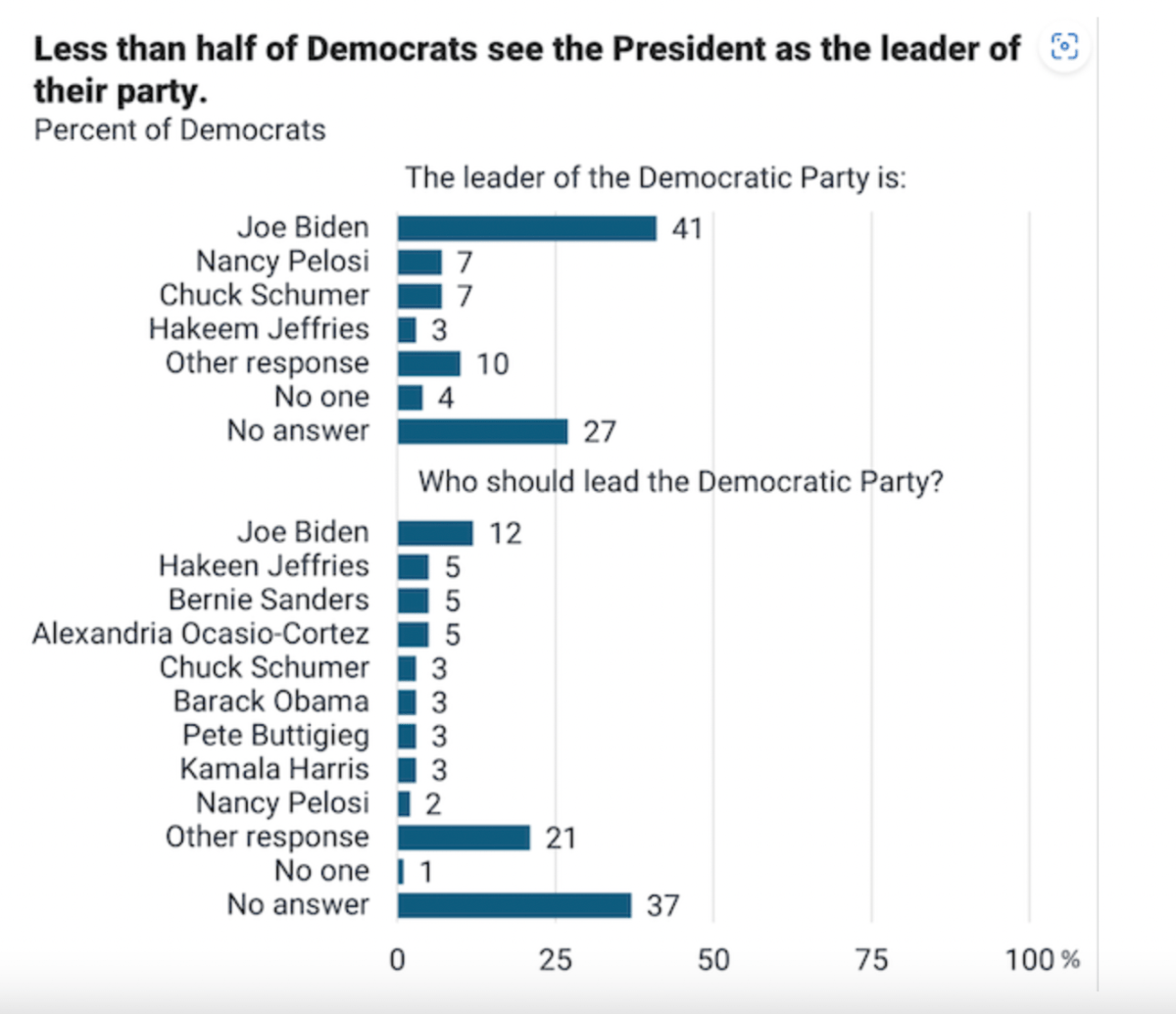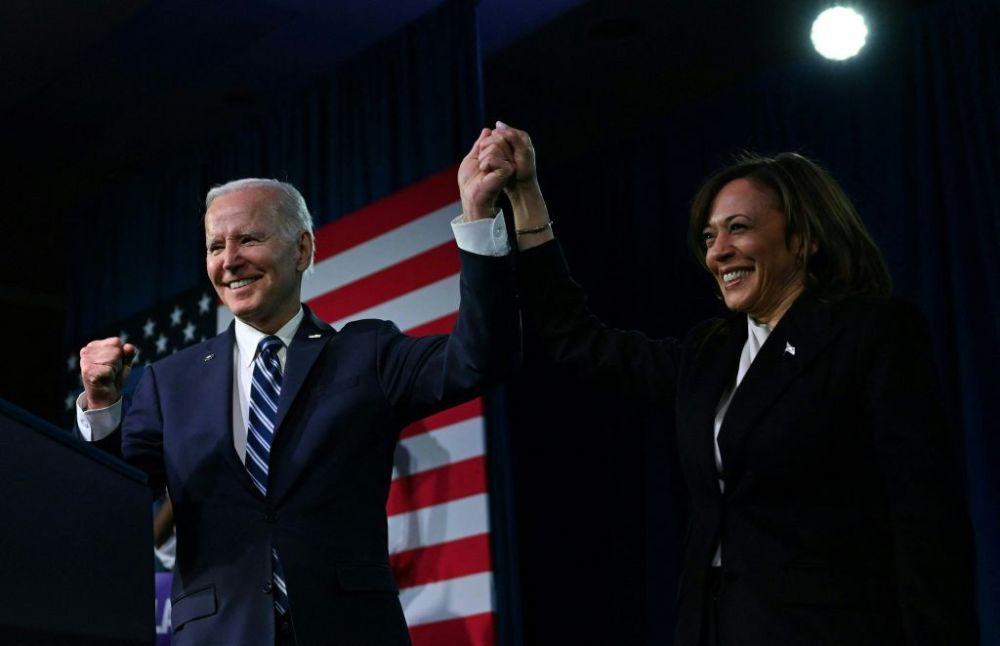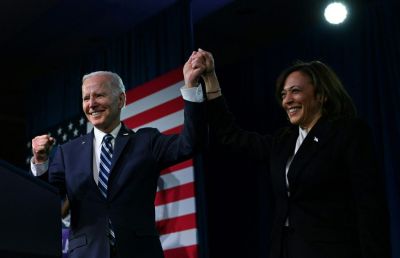I spend most of my time navel-gazing about how the modern Republican Party can’t be trusted to govern responsibly, and for good reason. There’s no shortage of material. Each day brings new evidence to support the thesis, which is useful when you’re writing a daily newsletter.
Here, for instance, is the latest dispatch from Rolling Stone about alleged chitchat at Mar-a-Lago between rounds of golf and kibitzing with wedding parties.
Specifically, Trump has talked about bringing back death by firing squad, by hanging, and, according to two of the sources, possibly even by guillotine. He has also, sources say, discussed group executions. Trump has floated these ideas while discussing planned campaign rhetoric and policy desires, as well as his disdain for President Biden’s approach to crime.
In at least one instance late last year, according to the third source, who has direct knowledge of the matter, Trump privately mused about the possibility of creating a flashy, government-backed video-ad campaign that would accompany a federal revival of these execution methods. In Trump’s vision, these videos would include footage from these new executions, if not from the exact moments of death. “The [former] president believes this would help put the fear of God into violent criminals,” this source says. “He wanted to do some of these [things] when he was in office, but for whatever reasons didn’t have the chance.”
A Trump spokesman denied the claim but the big guy is known to admire the brutal extrajudicial crackdown on accused drug dealers in the Philippines and called last year for speeding up the trial process to expedite executing them here in the U.S. The idea that any social problem can be solved with greater violence and ruthlessness is perfectly on brand for him, as is the attraction to “flashy” media promos.
If one party is led by a dotard who spends money too freely and the other is led by a strongman who thinks there’s nothing wrong with America that can’t be fixed by more mass executions, a commentator will spend more of his time on the latter than the former. Or should, anyway.
But here’s a bit of trivia that might surprise you: The strongman’s party is more excited about him running for president again than the other party is about the dotard running.
Maybe it doesn’t surprise you. The post-Trump GOP is a cult of personality that worships illiberalism as “strength,” you might say. Of course its members will clamor for their cult leader. There’s less clamoring going on than you might think, though. In three recent polls, the share of Republicans who want to see Trump lead the party again in 2024 fell short of 50 percent.
The ominous truth is that it’s not just cultish loyalty on the right that explains the enthusiasm gap between Trump and Joe Biden. Deepening doubt about Biden on the left is driving it as well.
In fact, there may be no presidential ticket in my lifetime whose fitness for office is more suspect among its own supporters than Biden/Harris 2024.
You want numbers. I’ve got numbers.
Earlier this month the Washington Post found fewer Republicans want to see Trump nominated again in 2024 than want to see someone else on the ballot, 44-49. That’s discouraging for the former guy but still conspicuously better than Biden’s polling. The same survey found 31 percent of Democrats want him back as nominee, versus 58 percent who prefer an alternative.
The data turned grimmer when respondents were asked specifically about their enthusiasm for each candidate. A third of Republicans declared themselves enthusiastic about a third Trump run; just 16 percent of Democrats said the same about Biden running again.
That poll was no outlier. On Tuesday Reuters released its own survey finding 40 percent of Republicans opposed to another Trump run versus 52 percent of Democrats opposed to Biden being back on the ballot. When tested against fellow Democrats like Bernie Sanders in a hypothetical primary, Biden managed just 35 percent of the Democratic vote. In a hypothetical Republican primary, Trump pulled 43 percent of Republicans.
Then there’s the Associated Press. Here again, 37 percent of Democrats want Biden to seek the party’s nomination in 2024. Among members under the age of 45, a mere 23 percent say so. That jibes with the Post’s finding that 69 percent of Democrats and left-leaning independents under the age of 40 believe the party should nominate someone else this time.
Finally, there’s this, also from the AP.

Interestingly, Biden polls much higher among Democrats than Trump does among Republicans (18 percent) when both sides are asked who the leader of their party is, although perhaps that’s to be expected when one is a sitting president and the other isn’t. More interesting is Biden’s puny showing on the question of who should lead the party. Trump is at 22 percent among Republicans on that metric while Ron DeSantis stands at 20 percent. The incumbent commander in chief, who received more votes in 2020 than any candidate in American history, registers … 12 percent.
All of this strikes me as remarkable.
It’s remarkable foremost because Trump is facing a serious primary from a formidable opponent in DeSantis while Biden is facing the smoothest of smooth sailing within his own party. The closest we’ve gotten to a Democrat challenging him is Gavin Newsom adamantly denying that he’ll do so when pestered about it by the press. The Democratic establishment is terrified of weakening Biden ahead of a rematch with Trump in 2024, knowing what tends to happen to incumbent presidents who endure a tough primary while seeking reelection. No one will lay a finger on Joe.
Under those circumstances, you would expect Republican voters to have greater misgivings about sticking with their last nominee than Democratic voters have. But here we are.
The numbers are also remarkable because Biden has had a reasonably successful run over the last four months. His party beat all expectations in the midterms. Job growth has been explosive despite rising interest rates. His opponents spent a week under the media spotlight in January showing off their dysfunction as they struggled to elect a new speaker of the House. And he seemed to get the better of them during his State of the Union address, at which he looked spry and focused when rattling off the numerous bipartisan legislative achievements he scored during his first two years.
This week he touched a high of 44.4 percent in the RealClearPolitics job approval tracker for the first time since late 2021. Taking all of that into account, one might expect his party to feel enthusiastic about having him back on the ballot in 2024. They aren’t. Why?
You know why. “He is already the oldest president to serve, and 51% of Democrats in the poll said he cannot handle the physical toll of the presidency,” Reuters reported in its new survey. A dotard on a hot streak is still a dotard. Most of the president’s party simply no longer believes he’ll remain fit to serve throughout a second term.
His party is growing more skeptical of his abilities by the day too, it seems. This month the AP found fewer Democrats of all ages willing to say that Biden should run again than said so last October. Among those under age 45, the number dropped by more than 20 points. Partly that might be due to certain “cold spells” Biden has experienced during his hot streak—“Document-gate,” for one, or the fact that the party did ultimately end up losing the House (barely). The midterm success of up-and-comers like Gretchen Whitmer might have also convinced some liberals that the party’s bench is deeper than thought and therefore it’s safe-ish to turn the page on Biden now.
But my guess is that most of the erosion in wanting him to run again is a straightforward byproduct of Democrats catching clips of him speaking on the news and thinking, “There’s no way he’ll be coherent in 2029, assuming he makes it to 2029.”
Which wouldn’t be a crisis-level problem, perhaps, if he had a running mate who inspired confidence in her ability to serve effectively as president if called upon to do so without notice.
That is … not the situation Democrats find themselves in.
We’ve had presidential tickets in recent memory in which the competence of one or the other candidate was in doubt, and by “competence” I mean it in either sense of the word. Or, in Donald Trump’s case, both.
If you thought Dan Quayle and Sarah Palin were badly out of their depth, you could take heart in the fact that George H.W. Bush and John McCain were seasoned pros who weren’t freakishly old. Bush was a spry 68 when he ran for reelection in 1992; McCain was 72, quite old for a potential first-termer even now, but he betrayed no signs of the sort of cognitive slowdown that has so many Democrats worried about Biden.
If you thought Bob Dole was too old in 1996 or that Trump was too crazy in 2016 or 2020, you could take heart in the fact that Jack Kemp and Mike Pence were also seasoned pros who seemed capable of handling the top job if necessary. They might not be your cup of tea on policy, but you wouldn’t need to worry about them keeling over or looking lost if they inherited the presidency. You might, in fact, even prefer them in the job to their running mate.
Biden/Harris is the first ticket in my lifetime in which both running mates seem incompetent, albeit in different meanings of the term.
The left-wing effort to rehabilitate Kamala Harris’ image should be in full swing right now given the non-zero probability that she’ll be the Democratic nominee next year. Recently the New York Times handed her advisers an opportunity to start that rehab when it reached out to them for a story about her struggle to establish herself as VP. What happened next speaks volumes about her standing in the party.
But the painful reality for Ms. Harris is that in private conversations over the last few months, dozens of Democrats in the White House, on Capitol Hill and around the nation — including some who helped put her on the party’s 2020 ticket — said she had not risen to the challenge of proving herself as a future leader of the party, much less the country. Even some Democrats whom her own advisers referred reporters to for supportive quotes confided privately that they had lost hope in her.
The Washington Post also went looking inside the party for enthusiasm about Harris and came up empty. They interviewed more than a dozen Democratic leaders in swing states and found consensus: “Harris’s tenure has been underwhelming, they said, marked by struggles as a communicator and at times near-invisibility, leaving many rank-and-file Democrats unpersuaded that she has the force, charisma and skill to mount a winning presidential campaign.”
That opinion is broadly shared by the public. Again, there are numbers.
Scroll through the RealClearPolitics tracker of presidential hopefuls’ favorable ratings and you’ll find Harris at 38.2 percent, several points behind Biden and DeSantis and just a whisker ahead of the “deranged hobo” who tried to overthrow the government a couple years ago. She leads in 2024 Democratic polling when Biden isn’t included in the field but her numbers are weak and declining. In December 2021, Morning Consult found her with 33 percent of the vote; by September of last year, she had dipped to 28 percent. Another recent poll has her at 29 percent, a mere 10 points ahead of—yeesh—Hillary Clinton despite the fact that Harris surely has higher name recognition within the party of any current officeholder except her boss.
Scroll up and look again at that dismal AP graph showing 12 percent of Democrats believe Biden should continue to lead the party. A dynamic like that seems ripe for voters to look to his No. 1 for leadership. Instead Harris is tied for seventh place with Pete Buttigieg, behind Alexandria Ocasio-Cortez.
One strains to find something encouraging to say about her as a politician. The closest I can get is remembering that she could be effective in the Senate when questioning witnesses during committee hearings. But other than that? She hasn’t performed impressively on the ballot, somehow nearly losing to a Republican in California in her first run for attorney general and then winning with less than 40 percent of the vote in her run for Senate against a field that included someone who “dabbed” at the podium during a debate.
About her run for president in 2020, the less said, the better.
During her time as vice president, she’s given several comically disastrous high-profile interviews and disappeared from public view for long stretches, seemingly to avoid giving another. “Staffers who worked for Harris before she was vice president said one consistent problem was that Harris would refuse to wade into briefing materials prepared by staff members, then berate employees when she appeared unprepared,” the Washington Post reported in December 2021. Whether because of paranoia about making another major gaffe or lack of preparation, she radiates lack of confidence when responding to questions.
On top of everything else, Biden tasked her with addressing the border crisis and leading the effort in Congress to expand voting rights, two famously intractable policy stalemates where failure was all but assured. Add it all up and the person who’s second-most likely to be the Democratic nominee in 2024 is a poor retail politician with an underwhelming electoral record who failed to impress in more than two years as vice president and who’s about as well-regarded by American voters as Donald Trump.
Oh, and like Trump, she’s an authoritarian. Just to further sweeten the pot.
Some Democrats will tell you that their fears about Harris have more to do with doubting that benighted Americans would elect a black woman president, especially with Trump as the alternative on the ballot, than with Harris’ own weaknesses, but I dunno. I suspect they’d be reasonably upbeat if Michelle Obama suddenly announced a 2024 candidacy. As it is, a Democratic fundraiser told the Times that he expects one of the GOP’s most effective attack lines next fall to be, “A vote for Biden is a vote for Harris.”
Imagine. For all of the right’s complaints about Biden as president, Harris is so distrusted by the public that Republicans might do better to focus their messaging on the specter of having her as president than him.
A ticket in which neither member, for different reasons, is deemed equal to the task of being president is a ticket that’s more than capable of losing. Even if the other party is running a soon-to-be criminal known to dine with Nazis and to muse occasionally about terminating the Constitution so that he can be president again immediately.
And whose own potential running mate, by the way, might be grossly unqualified for office herself.
I’ll take incompetent over malevolent, but the prospect of a presidential election in which all four candidates at the top of the ballot are laughably unfit to wield power is so dark that I can scoff only half-heartedly at the quadrennial fantasies about a third-party candidate rising to rescue America. It’ll never happen for the usual strategic reason—in the end, disgruntled partisans on both sides will fall in line behind their respective party nominees for fear that dividing their votes will lead to the other party winning with a plurality. But if ever there was a political moment that cried out for a bold independent alternative, a race between Biden/Harris and, say, Trump/Lake is it.
What do you think? Mitch Daniels/Joe Manchin or Joe Manchin/Mitch Daniels?







Please note that we at The Dispatch hold ourselves, our work, and our commenters to a higher standard than other places on the internet. We welcome comments that foster genuine debate or discussion—including comments critical of us or our work—but responses that include ad hominem attacks on fellow Dispatch members or are intended to stoke fear and anger may be moderated.
With your membership, you only have the ability to comment on The Morning Dispatch articles. Consider upgrading to join the conversation everywhere.